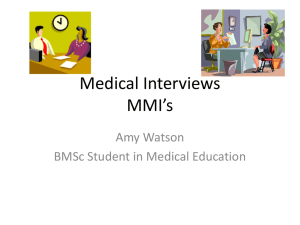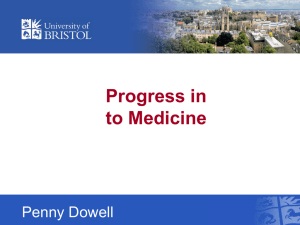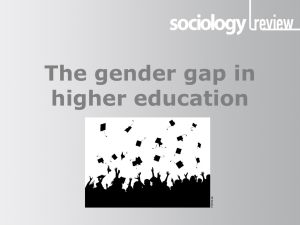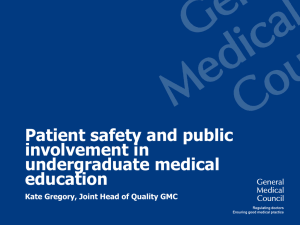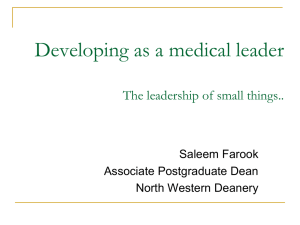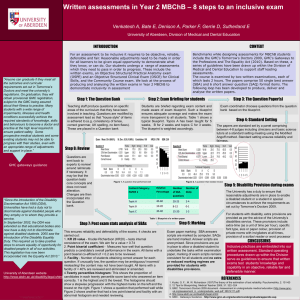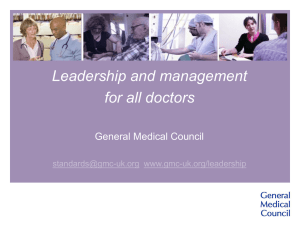- The Scottish Doctor
advertisement
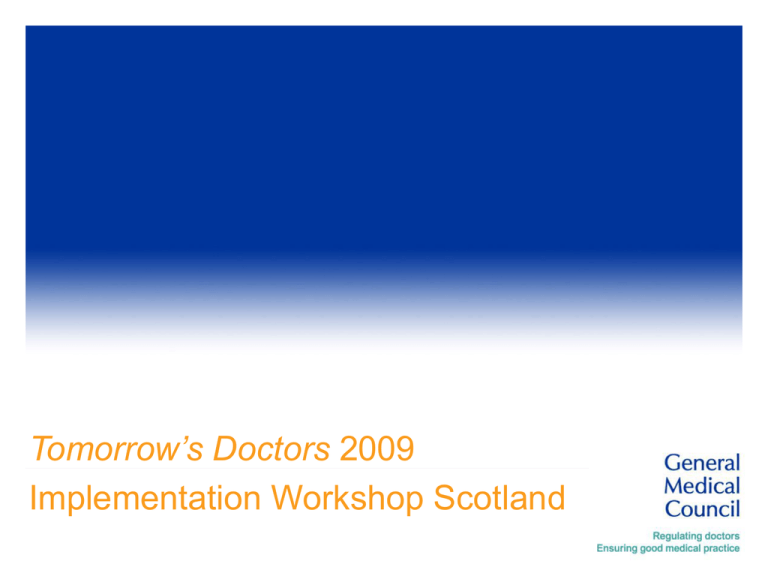
Tomorrow’s Doctors 2009 Implementation Workshop Scotland Tomorrow’s Doctors 2009 implementation Martin Hart Assistant Director, Education 6 May 2010 Health and Safety Purpose for the day To enable medical schools, deaneries, employers and other stakeholders to jointly review progress towards the implementation of Tomorrow’s Doctors 2009 and to discuss local key challenges and responses To discuss areas for additional guidance and support and options to enhance the quality assurance of basic medical education Scotland Five Medical School The Scottish Doctor NHS Education for Scotland Four Deaneries One Foundation School Programme 10:00 GMC presentations 10:40 School, Scottish Government/Employer and Deanery presentations 12:30 Question and answer session 13:00 Lunch 14:00 Break out sessions 15:30 Coffee break 15:45 Feedback 16:15 Questions 16:30 Workshop finishes GMC update - Merger of PMETB into the GMC and Patel Review Context for merger February 2008, the Secretary of State announced that PMETB would be merged with the GMC, following a recommendation from Sir John Tooke's Independent Inquiry into Modernising Medical Careers: PMETB should be assimilated in a regulatory structure within GMC that oversees the continuum of undergraduate and postgraduate medical education and training, continuing professional development, quality assurance and enhancement Following the merger on 1 April, all stages of medical education and training are now part of the GMC's remit. Benefits of the merger Simplified regulatory structure Single point of contact for key interests Sharing best practice Integrated approach to education and training across continuum Greater access to resources of GMC, and efficiencies from one organisation Patel Review Lord Naren Patel commissioned to lead review of the regulatory framework for medical education Working group set up, chaired by Lord Patel, comprising members of GMC and PMETB Wider reference group of key interest groups to enable us to test emerging thinking Patel Review considered Understanding the continuum Stages of education and training – particularly the transitions Quality assurance Legislation Patel Review Preliminary conclusions of the review were consulted on in January to March 2010 The final report was published in April 2010 and is available on our website www.gmc-uk.org: ‘Recommendations and Options for the Future Regulation of Education and Training’ Implementation of Tomorrow’s Doctors 2009 Professor Jim McKillop Scotland, 6 May 2010 Tomorrow’s Doctors 2009 Why Tomorrow’s Doctors was reviewed Changes: Foundation Programme PMETB’s approach to standards and QA Pressures due to student numbers, EWTD, patient throughput, move from old-style ‘firm’, community-based training Patient and employer expectations Challenges, real or perceived: Prescribing and practical skills Scientific knowledge Professionalism, leadership, team-working Assessment Tomorrow’s Doctors Consultation Sources for review: QABME GMC guidance, new educational frameworks, research Dr Jan Illing, How prepared are medical graduates to begin practice? Responses: Wide engagement with key stakeholders 634 written submissions, Skills for Health survey of 230 NHS staff UK wide events Consultation meetings in Scotland Stonewall Scotland Edinburgh and Lothian Racial Equality Council Voluntary Health Scotland Medical Students from the five Scottish Medical Schools BMA Scotland Tomorrow’s Doctors 2009 structure Foreword by the Chair of GMC Introduction: responsibilities of GMC, schools, NHS organisations, doctors, students Outcomes for graduates Standards for delivery Appendices: 1. Practical procedures for graduates 2. What the law says 3. Related documents [and links throughout] 4. Glossary Overarching outcome ‘Medical students are tomorrow’s doctors. In accordance with Good Medical Practice, graduates will make the care of patients their first concern, applying their knowledge and skills in a practical and ethical manner and using their ability to provide leadership and to analyse complex and uncertain situations.’ Outcomes for graduates Overarching outcome The doctor as a scholar and scientist The doctor as a practitioner The doctor as a professional Outcomes for graduates: key elements Biomedical and other sciences Diagnosis and managing presentations Safe prescribing skills List of diagnostic and therapeutic procedures Teamworking and leadership Working in the NHS and improving healthcare Standards for delivery of teaching, learning and assessment Standards for delivery Patient safety Quality assurance, review and evaluation Equality, diversity and opportunity Student selection Design & delivery of curriculum including assessment Support & development of students, teachers & local faculty Management of Educational teaching, resources learning and and capacity assessment Outcomes Standards for delivery: some key themes Patient safety Practical experience: Placements planned and structured Agreements between schools and providers Student Assistantships Shadowing and induction into F1 Assessment Student support, health, equality Quality control and input from patients and employers Tomorrow’s Doctors 2009 Published in September 2009 Standards and outcomes will apply to all UK medical schools from 2011/12 GMC Undergraduate Board has agreed to produce additional guidance on: Assessment Clinical placements Standards for teachers and trainers Enhanced Annual Return (EAR) All schools reported to be on track for compliance All schools have identified areas to work on Key challenges for all schools: Patient and employer feedback in quality management Delivery and management of clinical placements MPET Review & funding The State of Basic Medical Education March 2010: The State of Basic Medical Education published: Summarises key findings of QABME Shares examples of schools’ practice Shares experiences from schools and visitors involved in QABME Includes comments from a range of perspectives on recent developments, and future opportunities and challenges Options for the Enhancement of QABME Survey https://gmc.e-consultation.net/econsult/default.aspx Options for the Enhancement of QABME Survey Seeking views on options to enhance QABME to ensure it remains fit for purpose. Survey presents a number of issues and options, and asks for feedback on a number of options to: 1. Enhance sharing good practice between schools 2. Quality assure outcomes for graduates 3. Enhance consistency and comparability in judgements about schools 4. Also asks for input on how the role of students, employers and those involved in Foundation Training, and patients and the public can be enhanced in QA activities “Can you remind me just what we’re looking for?” Contact us Website: www.gmc-uk.org Email: quality@gmc-uk.org QA Survey ends 28 May 2010 Tomorrows Doctors Implementation Workshop University of Dundee Medical School Gary Mires Medical Schools consideration of TD2009: approach • Workshop • Self reflection on compliance • Generation of a series of action points Domain Criteria Compliant Some work required Significant change required 1.Patient safety 5 5 0 0 2.QA, review and evaluation 8 3 4 1 3.Equality, diversity and opportunity 5 4 1 0 4.Student selection 5 3 2 0 5.Design, delivery and assessment of curriculum 9 6 3 0 6.Support and development of students and teachers 6 4 1 1 7.Management of teaching and learning 3 2 1 0 8.Educational resources and capacity 3 0 3 0 9.Outcomes 4 1 3 0 Overall 48 (100%) 28 (58%) 18 (38%) 2 (4%) Well placed • Patient safety: – Patient safety lead • Quality assurance: – Local working relationships with NHS / DoME – Local SLA / job planning – ACT funded QA lead • Student selection: – MMI Well placed • Design / delivery / assessment: – Range of learning opportunities – Foundation apprenticeship placements – New acute care module to include prescribing – SSC programme – Portfolios – Assessment of outcomes – Common shadowing Well placed • Support and development of students and teachers: – Staff development officer – ‘Tiered’ programme according to needs – Professional Development Awards • Educational resources: – New education build Work required: • Quality Assurance: – Feedback from patients – Feedback form employers – Peripheral placement monitoring and SLA’s • Equality and diversity: – Equality and diversity training • Design / delivery / assessment: – Feedback provision • Support and development of students and teachers: – Training, support and appraisal for teachers and defining expectations of Medical School Outcomes for Graduates Diagnostic / therapeutic procedures Scholar and Scientist Overall: Compliant 65% Partially compliant 32% Work required 3% Professional Practitioner Outcomes for graduates issues • Areas most work required relate to: – Global health issues – Health service management / organisation /economics / regulation – Doctors as managers / leaders – Psychological outcomes e.g. adaptation to life changes – Prescribing Examples of actions to deliver TD2009 and provide evidence of compliance • NHS responsibilities and expectations of Medical School: – Roles responsibility pack for clinical teachers – User friendly ‘distillate’ of TD for NHS / clinicians highlighting areas relevant to them – Engage NHS teaching leads to support delivery • Staff training and support: – Targeted programme of work on staff development including equality and diversity training • Student assistantships: – Build on current Foundation Apprenticeship blocks – Look at examples from Foundation training for assessing competence • Outcomes for graduates: – Implement recent review of basic science teaching to reflect shift towards more comprehensive teaching of biomedical and social science in TD 2009 – Acute care module implementation – Continue prescribing teaching enhancement work • Evidence: – Establish ‘Tomorrows Doctors database’ with ongoing collection of evidence of compliance – Work on approaches to provide evidence of compliance e.g. students working within capability Further guidance / support • Support and development of teachers and local faculty (TD 128 and 148) • Nature and process for quality data from employers about preparedness of graduates (TD 43) • Nature and process for quality feedback data from patients (TD 43) • Expectations of Student Assistantships (TD 109) • Shadowing period (TD 110) • Non compensation in assessment versus integration Tomorrow’s Doctors 2009 GMC Workshop Prof Hamish McKenzie University of Aberdeen www.abdn.ac.uk/dit Tomorrow’s Doctors - Curriculum review commenced in - 2004/5 New final year in 2008/9 New years 1 – 3 rolled out from 2009/10 onwards Many of the changes of TD2009 anticipated Curriculum Steering Group reviewed TD2009 in February and identified areas for further work www.abdn.ac.uk TD2009 - What are we doing - What do we need help with - Doubts and concerns www.abdn.ac.uk TD2009 – what are we doing - Outcomes for graduates – Psychological principles (para 9) – Social science principles (para 10) – The doctor as a professional (paras 20 -23) - Staff development - Quality management www.abdn.ac.uk TD2009 – help Domain 9. Outcomes - Para 172: “Quality management will involve…..collection and use of information about the subsequent progression of graduates in relation to the Foundation Programme and postgraduate training, and in respect of any determinations by the GMC....” www.abdn.ac.uk TD2009 – help Domain 5: Design and delivery of the curriculum, including assessment Para 121 - ” medical schools should make arrangements so that graduates’ areas of relative weakness are fed into their Foundation Programme portfolios......” www.abdn.ac.uk Doubts and concerns - Assessment of competences - Student assistantships - Feedback from patients www.abdn.ac.uk Doubts and concerns Domain 6: Support and development of students, teachers and local faculty Para 128 “Everyone involved in educating medical students will be appropriately selected trained, supported and appraised” www.abdn.ac.uk Doubts and concerns Domain 9: Outcomes Para 169 “Schools must track the impact of the outcomes for graduates and the standards of delivery as set out in TD against knowledge, skills and behaviour of students and graduates.” www.abdn.ac.uk Doubts and concerns External factors - New arrangements for selection into - Foundation Programme NHS teaching resource www.abdn.ac.uk www.abdn.ac.uk Tomorrow’s Doctors Implementation Workshop • University of Glasgow Medical School • Approach to the Challenge of TD3 • Prof. Jill Morrison • Head of Undergraduate School Consideration at Committees • Medical Education Committee – Standing item • Education Strategy Committee • Faculty of Medicine • Senior Curriculum Management Team Strengths • Preparation for Practice (Student Assistantship) implemented 2008-09 • Involvement in NES projects • Clinical Skills Challenges • Relationship with NHS partners • Selection, support, appraisal and training of all staff involved in teaching • Full mapping of curriculum Planning and Implementation • Course leaders identify areas of work • Summary of work prepared • Allocation of tasks • Monthly review at Medical Education Committee and Senior Curriculum Management Team Further support or guidance required • Support for negotiations with NHS • Guidance about detail of implementation e.g. SSCs “Tomorrow’s Doctors” Implementation Workshop University of Edinburgh Medical School Professor Allan Cumming MANY CHALLENGES Focus on two • Outcome-based education and assessment • The Student Assistantship GMC QABME, University of Edinburgh 2008/9 “Review and simplify the curriculum structure …….” “Rationalise the vertical themes running through the curriculum……” Outcome-based education and assessment Curriculum model (Edinburgh ) • Spiral • Core and options • Integrated ***** ***** • • • • • • Systems-based Discipline-based Problem-based Case-based Task-based Outcome-based ***** • • • • Student-centred **** Self-directed **** Multi-professional ** Community-centred **** **** **** ** *** ** ** Curriculum outcomes = preparedness for practice What to learn - content How to learn – educational strategy teaching and learning tools Assessment Educational environment Student What are we doing? • Edinburgh curriculum is being structured and described in terms of twelve Curriculum Outcomes • The assessment strategy is being aligned with these outcomes • “Tomorrow’s Doctors 2009” outcomes are the primary basis of the new structure - with appropriate additions to reflect the character of the Edinburgh graduate EDINBURGH MBChB OUTCOMES GMC TOMORROW’S DOCTORS 2009 OVERARCHING OUTCOME An Edinburgh medical graduate will be a caring, competent, confident, ethical and reflective practitioner, equipped for high personal and professional achievement, able to provide leadership and to analyse complex and uncertain situations. GMC 7. Medical graduates are tomorrow’s doctors. In accordance with Good Medical Practice, graduates will make the care of patients their first concern, applying their knowledge and skills in a competent and ethical manner and using their ability to provide leadership and to analyse complex and uncertain situations. THE DOCTOR AS SCHOLAR AND SCIENTIST Ability to apply to medical practice: 1. BIOMEDICAL AND CLINICAL SCIENCES GMC 8. Apply to medical practice the biomedical scientific principles, method and knowledge relating to: anatomy, biochemistry, cell biology, genetics, immunology, microbiology, molecular biology, nutrition, pathology, pharmacology and physiology. 2. PSYCHOLOGICAL ASPECTS OF MEDICINE GMC 9. Apply psychological principles, method and knowledge to medical practice. 3. SOCIAL SCIENCES AND PUBLIC HEALTH GMC 10. Apply psychological principles, method and knowledge to medical practice. GMC 11. Apply to medical practice the principles, method and knowledge of population health and the improvement of health and health care. 4. EVIDENCE-BASED MEDICINE AND RESEARCH GMC 12. Apply scientific method and approaches to medical research. THE DOCTOR AS PRACTITIONER Ability to: 5. Carry out a CONSULTATION WITH A PATIENT GMC 13. Carry out a consultation with a patient. 6. DIAGNOSE AND MANAGE CLINICAL PRESENTATIONS GMC 14. Diagnose and manage clinical presentations. 7. Undertake CLINICAL COMMUNICATION GMC 15. Communicate effectively with patients and colleagues in a medical context. 8. Carry out EMERGENCY CARE, FIRST AID, RESUSCITATION AND PRACTICAL PROCEDURES GMC 16. Provide immediate care in medical emergencies. GMC 18. Carry out practical procedures safely and effectively. 9. Apply principles and knowledge of PHARMACOLOGY AND THERAPEUTICS, GMC 17. Prescribe drugs safely, effectively and economically. including prescribing. 10. Apply principles and knowledge of MEDICAL INFORMATICS GMC 19. Use information effectively in a medical context. THE DOCTOR AS PROFESSIONAL Ability to: 11. Apply principles and knowledge of MEDICAL ETHICS, LEGAL AND PROFESSIONAL RESPONSIBILITIES GMC 20. Behave according to ethical and legal principles. 12. Demonstrate PERSONAL AND PROFESSIONAL DEVELOPMENT GMC 21. Reflect, learn and teach others. GMC 22. Learn and work effectively within a OUTCOMES – END PRODUCT OF THEMES • Each Outcome supported by an Outcome Theme (OT) • Each OT has a Theme Head and team • Curriculum content and assessments related to each OT planned and tracked electronically “a caring, competent, confident, ethical and reflective practitioner, equipped for high achievement, able to provide leadership and analyse complex and uncertain situations” 12 CURRICULUM OUTCOMES 12 THEMES The Edinburgh MBChB curriculum PRIOR LEARNING OUTCOMES PLUS equipped for high personal and professional achievement RECOGNITION OF EXCELLENCE RESEARCH MOBILITY STUDENT CHOICE HUMANITIES caring, competent, confident, ethical and reflective practitioner EXTRA-CURRICULAR 12 CURRICULUM OUTCOMES 12 THEMES SAFE PATIENT CARE PRIOR LEARNING SAFE PATIENT CARE Examples Overarching Degree outcome [1] Role outcomes [3] Curriculum outcomes [12] Detailed Curriculum outcomes [~60] Course outcomes [many] 1 2 3 4 5 “the Edinburgh graduate will be…” “Scientist/scholar; Practitioner; Professional “Ability to apply principles and knowledge of pharmacology and therapeutics, including prescribing” “Provide a safe and legal prescription” “Describe the adverse effects of warfarin” Levels of outcome in the Edinburgh MBChB degree programme. “Course” refers to any subdivision of the curriculum such as a module or clinical attachment. Outcome-base assessment and compensation •Tomorrow’s Doctors 2009, Para 117 •“Medical schools must have appropriate methods for setting standards in assessments to decide whether students have achieved the ‘outcomes for graduates’. There must be no compensatory mechanism which would allow students to graduate without having demonstrated competence in all the outcomes.” •Most ‘integrated’ assessment systems have some degree of compensation as an integral feature of their design. Ensuring that each of the outcomes has been passed by every student will require investment in resources and time to alter systems of assessment, data gathering and remediation. BLUEPRINTING Tracking Assessment of Outcomes Student Assistantship (StA) – some questions • Could the StA be considered an approach to teaching and learning lasting throughout final year? • If the StA is a discrete period of time within final year, how long should it last? • Even within a StA, students may not undertake activities that require provisional registration. This is interpreted in a variety of ways by clinical staff and NHS management. ? Is there guidance on how students should gain real-life experience in, for example: Prescribing drugs and fluids Injecting drugs into patients Injecting drugs into bags of fluids for IV infusion Accessing IT systems in hospitals and practices Professionalised teaching • Quality and quantity of teaching measured and recognised, linked to appraisal, job planning, and to funding • Systematic drivers to participate in staff development activities Paragraph 112, Tomorrow’s Doctors 2009: ‘Medical schools must ensure that all graduates have achieved all the outcomes set out in Tomorrow’s Doctors, that is: • each of the five outcomes under ‘The doctor as a scholar and a scientist’ • each of the seven outcomes under ‘The doctor as a practitioner’ • each of the four outcomes under ‘The doctor as a professional’ • every practical procedure listed in Appendix 1. This must involve summative assessments during the course that cumulatively demonstrate achievement of each outcome. The medical school must have schemes of assessment that map the outcomes to each assessment event and type, across an appropriate range of disciplines and specialties (‘blueprinting’). Students’ knowledge, skills and professional behaviour must be assessed. There must be a description of how individual assessments and examinations contribute to the overall assessment of curricular outcomes, which must be communicated to staff and students.’ Paragraph 117 Tomorrow’s Doctors 2009: ‘Medical schools must have appropriate methods for setting standards in assessments to decide whether students have achieved the ‘outcomes for graduates’. There must be no compensatory mechanism which would allow students to graduate without having demonstrated competence in all the outcomes.’ Producing tomorrow’s doctors: a school’s approach to meeting the challenge. Bute Medical School University of St Andrews Background to St Andrews Programme . Offers a B.Sc. Honours Degree in Medicine The new programme delivers the foundations of medical science through an integrated curriculum with a strong clinical context and early clinical contact. Students continue their clinical training at 5 partner clinical schools; Manchester, Aberdeen, Dundee, Edinburgh and Glasgow. 5 separate liaison committees have been established with these partner schools. Consideration of TD(2009) to date School Teaching Away day-focus of discussions. Teaching Management Group-standing item. Enhanced QABME Annual Return-self assessment sections. Curriculum Review Sub-committee-charged with addressing these issues. Challenges Ensuring that the curriculum at St Andrews attains as many of the outcomes for graduates and the standards in the 9 domains as is practicable and appropriate in its particular 3 year preclinical programme. Liaising with its 5 clinical partners in terms of achieving overall the outcomes and standards. Electronic Mapping of our curriculum to both Scottish Doctors 3 and Tomorrow’s Doctors 3. Integration of sociology with health psychology and public health medicine and appropriate input into this review. Challenges Development of standardised SLA for all medical schools and health boards in Scotland Staff development programme for clinical staff teaching medical students on a Scotland-wide basis. Equality, diversity and opportunity issues to ensure adherance to legislation. Equality Impact Analyses How is the school approaching planning and implementation of the new standards by 2011/2012 Curriculum review to identify and fill gaps and improve curriculum integration. Identification of vertical themes and tagging of these to make them explicit. Curriculum and assessment mapping via our online curriculum management system (Galen) to TD3 outcomes and domains. Consultation with our clinical partner schools. Areas for support and further guidance. Reasonable adjustments that need to be made for students with disabilities in accordance with current legislation and guidance. The nature of the data to be collected and analysed to monitor equality and diversity issues. The University policies necessary to permit the School to meet the standards set out in Domain 3Equality, Diversity and Opportunity. What would be viewed as reasonable staff development programmes for clinicians teaching students on placements or on campus PRODUCING TOMORROW’S DOCTORS: A SCOTTISH GOVERNMENT AND EMPLOYER’S PERSPECTIVE DR HARRY BURNS CHIEF MEDICAL OFFICER Key issues • THE CHANGING CONTEXT OF CLINICAL PRACTICE • THE CONTINUUM OF MEDICAL TRAINING IN THE UK • THE NEEDS OF NHS SCOTLAND CONTEXT • FINANCIAL CONSTRAINTS – RECENT GROWTH IN RESOURCES AND STAFFING LIKELY TO SLOW OR EVEN REVERSE • NEED TO IMPROVE EFFICIENCY AND PRODUCTIVITY • ALTERED SKILL MIX – INEVITABLE IMPACT ON DOCTORS’ ROLES 2013-14 2008-09 2003-04 1998-99 50 1993-94 55 1988-89 1983-84 1978-79 1973-74 1968-69 1963-64 1958-59 1953-54 1948-49 Percentage of national income National income vs expenditure Total Managed Expenditure Current receipts 45 40 35 30 CONTEXT • BROAD HEALTH AGENDA – AGEING POPULATION – ADVANCING TECHNOLOGY – PATIENT EXPECTATIONS – PERSON CENTRED CARE – PATIENT SAFETY – CLINICAL EXCELLENCE – ADDRESSING HEALTH INEQUALITIES THE AGEING POPULATION What matters most to patients • • • • • • • • • • A clean ward Staff cleaning their hands before touching patients Being treated quickly in an emergency Getting the best treatment for my condition Doctors knowing enough about my condition and treatment Clear explanations about what will happen during an operation or procedure Being told the risks and benefits of any treatment in a way I can understand Clear explanations of my condition or treatment Being treated with dignity and respect Being told how my operation has gone in a way I can understand Patient perceptions – Scotland is doing well Responding to what patients want and need It can be done “NHS Scotland has undertaken a bold, comprehensive, and scientifically grounded programme to improve patient safety. The dedication of NHS leadership at all levels to this endeavor is apparent to me, and bodes well for success. In its scale and ambition, the Scottish Patient Safety Programme marks Scotland as leader – second to no nation on earth – in its commitment to reducing harm to patients dramatically and continually.” Don Berwick June 2008 Alignment of policies – an opportunity CONTINUUM OF MEDICAL TRAINING • WIDE UNDERSTANDING THAT CURRENT SYSTEM IS NOT RIGHT • MMC/EWTD – DAMAGE TO TRUST IN SYSTEM – REDUCED FLEXIBILITY IN WORKING PATTERNS AND CAREER PATHS – SHIFT PATTERNS DISRUPTING TEAM WORKING AND APPRENTICESHIP CONTINUUM OF MEDICAL TRAINING • SOME CONCERNS ABOUT PREPAREDNESS FOR PRACTICE AT GRADUATION • CURRENT REVIEWS OF FOUNDATION AND PATEL REVIEW OF REGULATION • INCREASING SPECIALISATION IN TRAINING BUT NEED FOR MORE GENERALISTS IN SERVICE • CREDENTIALLING AND REVALIDATION WHAT THE SCOTTISH NHS NEEDS • EXCELLENT DOCTORS – PREPARED TO PRACTICE AT FOUNDATION LEVEL ON GRADUATION – BROAD SCIENTIFIC KNOWLEDGE UNDERPINNING EXCELLENT COMMUNICATION AND TECHNICAL SKILLS – ALREADY LEARNING HOW TO LEAD A CLINICAL TEAM WHAT THE SCOTTISH NHS NEEDS • PROFESSIONAL VALUES THAT PROMOTE QUALITY & ACCOUNTABILITY – – – – PERSON CENTRED CARE PATIENT SAFETY CLINICAL EXCELLENCE READINESS TO MEASURE PERSONAL OUTCOMES AND ACT ON THE RESULTS • ABILITY TO INNOVATE AND DEVELOP NEW APPROACHES AND TECHNIQUES WHAT THE SCOTTISH NHS NEEDS • DOCTORS THAT CAN DEVELOP IN DIFFERENT WAYS – HIGHLY SPECIALISED TERTIARY CARE CONSULTANTS & RURAL GENERALISTS – BUT WITH CORE VALUES OF QUALITY, LEADERSHIP, ACCOUNTABILITY AND EXCELLENCE • MEDICAL SCHOOL IS KEY TO ENSURING THOSE CORE VALUES Tomorrow’s Doctors 2009 - the NES Perspective Dr Duncan Henderson Chair, Scottish Foundation Board Dr Kim Walker Director, Scottish Foundation School NES Perspective • 5 years of Foundation Programme • Close partnership with Scottish Medical Schools • Feedback from Foundation Trainees on areas for improvement Educational Solutions for Workforce Development TD 2009 • Preparing for Practice • Student Assistantship • Shadowing • Induction – Deanery, Hospital, Unit Educational Solutions for Workforce Development NES / Deanery Role • Assist with implementation of: Preparation for Practice Student Assistantship • Feedback to Medical Schools Educational Solutions for Workforce Development Challenges • Placements – timing, geography • IT Access Educational Solutions for Workforce Development Question and Answer Feedback from breakout groups Group 1 Group 2 Group 3 Group 4 Provide a few key points or issues from the discussions Next steps Schools will be submitting a further Annual Return towards the end of 2010 to show progress and implemented plans. Please complete the Options for the enhancement of QABME survey on our website before 28 May. May 2010 a summarised note of today’s discussions will be sent via email. Please take a few moments to complete a feedback form. Thank you! Website: www.gmc-uk.org Email: quality@gmc-uk.org
